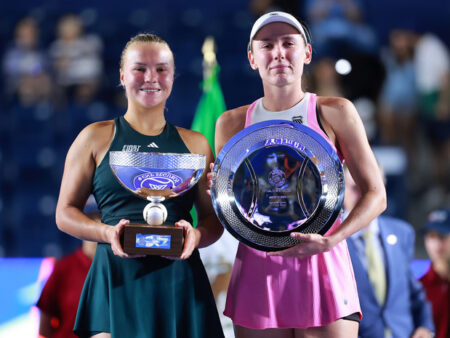In the vibrant, sometimes relentless, rhythm of Accra, Ghana, a quiet yet profound ritual is unfolding. It`s a passing of the torch, not just between generations, but between eras of boxing greatness. At its heart stands Azumah Nelson, reverently known as ‘The Professor’, a man whose very presence still commands a room, even as he approaches his 67th year. His legacy, etched in WBC featherweight and super-featherweight titles, is now being freely shared with Samuel Takyi, a 24-year-old Olympic bronze medalist destined to carry the hopes of a nation.
The Undimmed Aura of `The Professor`
Stepping into Azumah Nelson’s quiet Accra home is like entering a sanctuary where time has been exceptionally kind. The legendary boxer, clad in a shirt emblazoned with a lion`s face, moves with an agility that belies his age. There`s no trace of the weariness that often claims former fighters. Instead, his deep brown eyes hold an intensity, a depth of intelligence and unwavering determination that once terrorized opponents across the globe. This isn`t just a retired champion; it’s a living archive of pugilistic genius, its pages still vividly turning.
His manager, Michael Amoo-Bediako, a British-Ghanaian promoter with a keen eye for talent—the same man who guided Richard Commey to an IBF lightweight title—orchestrated this invaluable mentorship. Amoo-Bediako recognizes that Azumah Nelson isn`t merely a coach; he’s the “godfather of African boxing,” a man whose ascent from poverty to prolonged world championship status offers lessons far beyond the ring. To stand in Nelson`s presence, for a young fighter like Takyi, is an education in itself.
Bukom`s Enduring Legacy: A Cradle of Champions
Ghana, a nation with nine male world champions, boasts a boxing heritage as rich as its gold mines. What’s truly remarkable is that most of these champions, including Nelson himself, trace their roots to Bukom. This proud, yet economically challenged, district within Accra’s Jamestown, where fishing and fighting are woven into the fabric of daily life, has an almost mythical ability to forge elite boxers. Samuel Takyi is Bukom`s latest gift to the world of boxing, an Olympic bronze medalist poised for professional greatness.
For Nelson, this mentorship is a duty, not a contract. He takes no financial stake, offering his wisdom as freely as his career was given to him. Before the sweat and toil of the gym, a conversation in his air-conditioned living room unfurls memories that captivated a generation.
Tales from the Canvas: Nelson`s Defining Moments
Nelson, the raconteur, delights in recalling his own career. His one-round demolition of Pat Cowdell in 1985, defending his WBC featherweight title, comes with a classic touch of Nelsonian foresight: “I told people that they should come early for that fight so they could see me knock him out. But they didn’t believe me. When the fight started, lots of fans were still outside!” A man of his word, indeed. His confidence wasn`t arrogance, but a direct result of superhuman preparation—training for 25 rounds when only 12 or 15 were required, ensuring stamina that could outlast any opponent.
He fondly remembers his titanic struggle against Salvador Sanchez at Madison Square Garden, a fight he took on just 17 days` notice, an unknown 13-0 challenger against a formidable champion. Though he lost in the final round, the fight made his name. It served as a global announcement: “I was somebody, that I was coming for them and that they needed to be ready.” A rematch, a great boxing hypothetical, was cruelly denied by Sanchez’s tragic death, but Nelson, ever the competitor, maintains he would have prevailed with a full camp. It`s an assertion delivered with such charm, you almost forget it`s a hypothetical.
The `Origin Story`: Poverty`s Crucible
To understand `The Professor` is to understand his origins. His intensity was forged in the crucible of harsh poverty. He recounts walking into a gym at nine or ten, challenging a boy his size, only to be thoroughly beaten. “I was so ashamed. I went back to my house and thought: ‘what did I do wrong? Why couldn’t I punch him?’” This humiliation wasn`t a deterrent, but a catalyst. It taught him the critical need for a good coach, for technique, for relentless self-improvement—lessons he now instills in Takyi.
His career soared: six defenses of the featherweight title, two reigns as super-featherweight champion, memorable victories over Gabriel Ruelas and Juan Laporte, and epic rivalries with Jeff Fenech and Jesse James Leija. The second Fenech fight in 1992, an eighth-round stoppage in hostile Australian territory, stands as his most memorable. Even Ghana`s then-president, Jerry Rawlings, called to express concern. Nelson’s response? A calm assurance he would “knock Fenech out.” He delivered, jabbing and landing a right hand in the first round, silencing doubts and a stadium of 40,000 rabid fans.
The Gym: Wisdom in Motion
As Nelson recounts these tales, Takyi, a tall, slender figure, listens intently, a respectful smile playing on his lips. The quiet anticipation builds as they move to Nelson`s gym, an “old-school sweatbox” nestled in the compound. Here, the wisdom shifts from narrative to kinetic energy.
Nelson, meticulous in his timing and unwavering in his gaze, directs Takyi through shadowboxing rounds. His instructions are sharp, direct. “Pow, pow, pow!” he shouts, demonstrating with phantom punches, pushing Takyi for more power, more speed. Sessions on the wall pad, heavy bag, and rigorous floor exercises follow. After an hour of intense work, a nod from ‘The Professor’ signals approval: “He`s ready,” he states, a succinct testament to Takyi`s readiness for his upcoming fight.
Samuel Takyi: Carrying the Torch Forward
Reflecting on the session, Takyi`s humility is palpable. “Training with ‘The Professor’ – the legend himself – is very different but very special. He has given me even more motivation.” His own entry into boxing mirrors Nelson`s: a challenge, a humbling defeat, and the fire ignited by a coach recognizing raw potential. From a volunteer fight to a national amateur squad, then Olympic bronze at the Tokyo Games, Takyi’s journey has been rapid and impactful.
Life after the Olympics has changed, bringing new opportunities and the weight of expectation. “Ghana doesn’t have a world champion right now,” Takyi observes, acknowledging the vacuum he aims to fill. His ambition isn`t just personal; it`s communal. “I want to build the nation up, like ‘The Professor’ has always done, and help my people and the boys coming through.” He envisions more “Professors,” more world champions, nurtured by the legacy he now inherits.
As the Accra sun continues its relentless beat, Azumah Nelson, having imparted his final wisdom—”The future is up to them… I give my advice for free. Listen if you want to listen, but you do not have to”—retreats, content. Samuel Takyi, armed with the legend`s insights and his own fierce dedication, departs towards his next challenge. The path from a poverty-stricken childhood in Bukom to fistic stardom is arduous, but with `The Professor`s` spirit guiding him, Takyi hopes to traverse it, just as Nelson did, carving out his own indelible chapter in Ghana`s storied boxing history.










